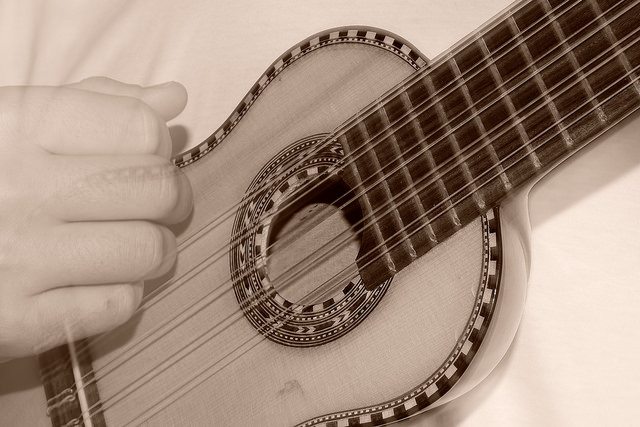On a cold Friday evening, Samuel Ali leans on a dark lamppost near the Foggy Bottom Metro station holding a little instrument. A box in front of him reads, “Thank you.”
He plays what many people would call a ukulele. “It is a charango,” he says in a Spanish dialect that denotes his Andean background. The instrument is typical of the Bolivian plateaus, his motherland.
The Metro entrance is at the hub of a section of street culture where a small market enlivens the neighborhood. One man tries to sell red flowers to every woman who passes by. Another vendor operates a small stand overflowing with souvenirs
As Ali plays his brown and beige instrument connected to speakers, thousands of workers from think tanks, banks and various international institutions walk towards the Metro station where they will find the mostly silent company of other riders. The crowd looks professional and serious, their faces turned downward. But the charango music brightens the street.
“I play in the street because I love it,” says Ali. He’s not sure the same can be said for the workers he sees going home with a noticeable aloofness this evening.
As a professional musician, Ali plays Andean style and has been able to publish more than 20 CDs, both solo and with a band of six other Bolivian composers. He also performs for private events such as weddings and baptisms. In the street, where he always plays by himself, Ali hopes to cheer people up. He started playing at 7-years old and has gained popularity with many audiences since.
As the people walking past listen in admiration to his music, he reminisces about his native land, which he misses dearly. He has spent the last 20 years traveling around the world, playing music on the streets of Jamaica, Cuba, France and England. Before returning to Bolivia, he dreams of playing in Australia and Japan. “The musician travels to make his music known to the world,” says Ali, right after thanking a little boy who graciously leaves a dollar in his box.
Ali says he loves music because it is “the universal language; you don’t need to translate it.” His love for music has taken him far away, but he hopes to return to Bolivia and retire there. After graduating with a major in business administration in a Bolivian university many years ago and working in the business sector for almost a decade, he decided to start performing in the streets, turning his passion into a profession, because he preferred to be his own boss. He says, “The musician is a free soul.”
Ali works on the street but doesn’t live there; he has a house in the outskirts of the city. He said he loves the recognition he gets from doing this street job, which is “like any other job.”
Homeless people, he says, are the most generous and grateful, as they continuously thank him for accompanying them with his melody in the harsh days of Washington DC’s winter. “Homeless leave everything they have, $10 or $15, because they like my music.” Curious walkers look at Ali in an attempt to decipher his words, but the slow melody of his charango doesn’t allow them to hear the conversation.
He lists the many instruments he is able to play: guitar, piano, saxophone and zampona – an instrument formed by hollow wood sticks of increasing lengths held together by a string – but the touching the charango to release beautiful music is what he loves the most, especially when done on the stage of the street. As busy commuters rush home from work after a busy day, they find solace in the sounds of Ali’s music.




